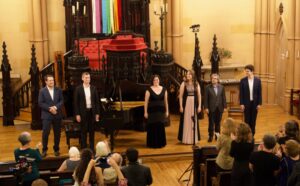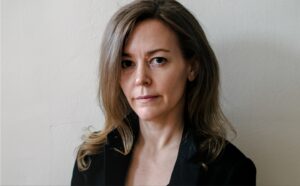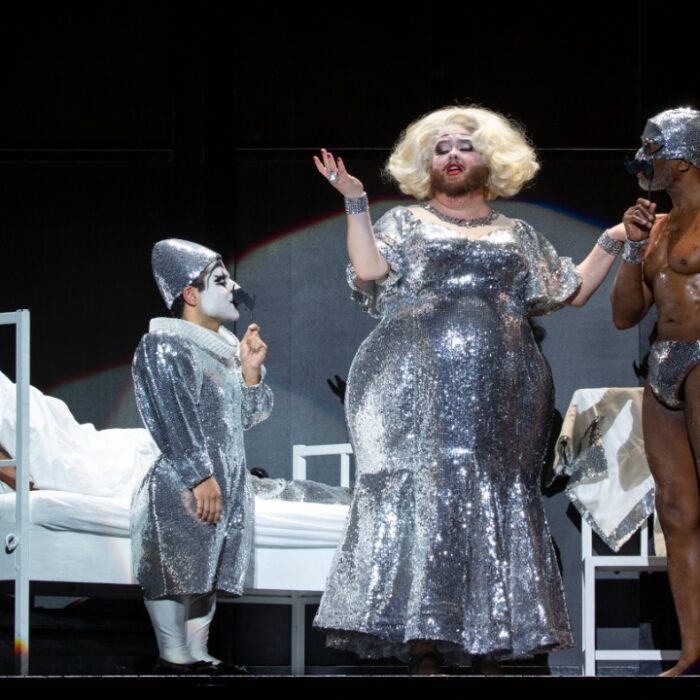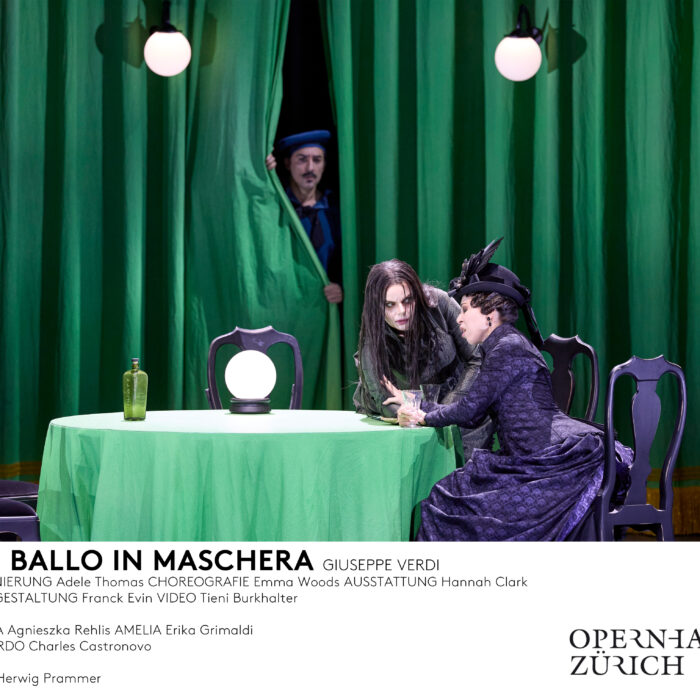
Brooklyn Art Song Society 2023-2024 Review: Circles I – Clara, Robert & Johannes
Three Composers Whose Art Songs Intertwined in Marriage, Friendship & Loss
By Jennifer PyronPhoto Credit: Catherine Hancock
Brooklyn Art Song Society (BASS) opened its 14th season with “Circles I: Clara, Robert & Johannes” on Friday, October 6th 2023 to an audience of engaged listeners and avid art song lovers.
Artistic director Michael Brofman welcomed everyone and introduced Dean Whiteside of the Goethe-Institute for his pre-concert lecture pertaining to the intimate details behind some of Clara, Robert and Johannes’ best known art songs.
Setting the Stage
Dean Whiteside’s pre-lecture illuminated the personal interests of each composer throughout their life as both a maker and a human being. Clara and Robert Schumann were first introduced to Johannes Brahms around the time when he was twenty-years-old. His musicality matched his charming personality and both Clara and Robert were interested in encouraging the development of his composing career. While staying with the Schumann’s, Brahms understudied Robert and absorbed his teachings. However, Brahms was also determined to stay true to his own inner-voice and so took what he wanted and left behind what he did not.
Whiteside also mentioned how Robert injured one of his fingers and was unable to play. This greatly affected the Schumann family’s income. It was also during this time when Clara took on more performance opportunities than would ever be expected of a woman, or encouraged. Despite the grueling schedule and weight of expectations, Dean Whiteside brought to the surface how Clara’s impact as a composer and performer took hold. She would go on to be better known in a way that she might not have, given history’s circumstances and undermining of female artists.
Whiteside also shared how all three composers kept journals during their time together. The art songs for the evening’s live performance were like a mirror revealing the inner-workings of the heart, mind and soul. Robert Schumann was known for getting lost in his own imagination the most, and creating ideas of alter egos. His music, along with Clara and Johannes, pairs well with Heinrich Heine’s text. The romantic language they share through their work is the intertwining result that continues to draw listeners in a special way.
Clara
Soprano Elisabeth Marshall accompanied by Michael Brofman on piano, began the evening’s performances with Clara Schumann’s works. “Ich stand in dunklen Träumen Op. 13 no. 1,” “I Stood Darkly Dreaming,” was the perfect opening song to match Brooklyn’s foggy October mood. Marshall’s voice was bright as she navigated the German diction with an ease of lightness. If one closed their eyes to listen, they might imagine Clara sitting at her piano, reflecting on every word of Heinrich Heine’s text.
“Er ist gekommen in Sturm und Regen Op. 12 no.1,” “He came in storm and rain,” is when Marshall’s voice blossomed into a silvery tone of delight. She spun her vibrato in a way that married both the text and musicality of her voice very well. “Liebst du um Schönheit Op. 12 no. 2,” “If you love for beauty” and “Warum willst du and’re fragen Op. 12 no. 3,” “Why enquire of others” were the middle pieces of her lineup and when Marshall really leaned into the meat of her own voice. It’s also important to note how her emotions affected her tonal palette through Friedrich Rückert’s text. A listener might have preferred to look away from their translation pages in the program at this point because Marshall very clearly translated each poem through her performance. Mike Brofman adhered to Marshall’s vocal dynamics with sensitivity at the piano. His playing was the perfect frame for her voice.
Brahms
Mezzo soprano Katherine Reese-Lerner and baritone Brian Mextorf alternated Johannes Brahms’ lieder for the middle performance section, accompanied by Mike Brofman on piano. The back and forth between both singers was an interesting choice, but for this review it is important to focus on the development of story telling and vocal range of both singers individually. Listeners were enamored with how well each singer really came into their own voice throughout this lineup. Katherine Reese-Lerner especially was on fire during her passionate performance.
“Ständchen, op 106 no 1,” “Serenade” was a tranquil opener for Reese-Lerner to gently arrive in the mix. Her voice was serene and glossy. In her second song, “Sapphische Ode Op. 94 no. 4,” “Sapphic Ode,” Reese-Lerner opened up more. Her powerful presence sank its teeth into the descriptive poem by Hans Schmidt. Her interpretation of Schmidt’s text, “Doch verstreuten reich die bewegten Äste tau, der mich näßte,” “But when I moved the branches, they showered me with dew,” was absolutely magical. And again in the same song when Schmidt writes “Doch auch dire, bewegt im Gemüt gleich jenen, Tauten die Tränen,” “But you too, moved in your heart like those roses, shed the dew of tears,” Reese-Lerner awakened the hearts of listeners alike.
“Wie Melodien Op. 105 no. 1,” “Like Melodies,” was a softer song for Reese-Lerner’s prowess, but also a respectable option because it lead up to her performance of “Die Mainacht Op. 43 no. 2,” “May Night.” In this lied, she let loose everything she had built up internally along the way. “Suche dunklere Schatten, und die einsame Träne rinnt,” “Seek darker shadows, and the lonely tear flows down,” Reese-Lerner sang with soulful conviction. This particular poem by German poet Ludwig Christoph Heinrich Hölty resonated from a spiritual synthesis space within her. She was the spirit of every word brought back to life in this lied. It was remarkable and perfectly spooky for October!
Baritone Brian Mextorf’s voice is a delightful instrument and his stage presence is transparent. The lied reflected through him in an innocent and honest manner. He was an excellent choice to pair alongside Reese-Lerner. “Minnelied Op. 71 no. 5,” “Love Song,” with text by Hölty sounded refreshing in Mextorf’s warm vocal instrument. “Daß meine Herz, gleich dieser Au, Mög’ in Wonne blühen!,” “That my heart, like this meadow, Might bloom in bliss!,” was especially beautiful in Mextorf’s voice.
“Geheimnis Op. 71 no. 3,” “The Secret,” with text by German poet Karl August Candidus, was most aligned with Mextorf. His voice expanded as he sang, “Von uns’rer Liebe süss,” “About our sweet love.” “Verzagen Op. 72 no. 4,” “Despair,” by librettist Karl Lemcke came to life as Mextorf’s voice sang “Du ungestümes Herz, sei still und gib dich doch zur Ruh’; Du sollst mit Winden und Wogen dich trösten, – was weinest du?,” “You, unruly heart, be silent and surrender yourself to rest; You should find comfort in winds and waves – why are you weeping?”
Mextorf’s voice carried a sense of release when he sang, similar to how one might feel while watching the waves of water gently lap the shoreline. It was easy to close one’s eyes and just bask in the simple joy that he brought into the evening’s mix of singers. His dynamics were most present as he sang “Von ewiger liebe Op. 43 no. 1,” “Eternal Love,” with text by August Heinrich Hoffman von Fallersleben. This lied really showcased Mextorf’s vocal stamina and expressivity. He concluded as he sang, “Unsere Liebe muß ewig bestehn!,” “Our love must endure forever!” His voice carried into the rafters behind the seated audience at Brooklyn’s First Unitarian Church with delight.
Dichterliebe, Op. 48
Baritone Gregory Feldmann and pianist Joel Harder presented Robert Schumann and Heinrich Heine’s “Dichterliebe, Op. 48, ” “A Poet’s Love,” in its entirety with pleasure! It was incredibly moving to hear all 16 lieds, and most inspiring to listen to its interpretation as performed by Feldmann and Harder. Gregory Feldmann’s voice has a unique and luminous resonance that fit this song cycle perfectly. His voice radiated with a deep assuredness and sense of knowing for every turn along the way, and German diction inflection that would arise. He sang this like he was living it!
The opening piano of “Im wunderschönen Monat Mai, ” “In the wondrous month of May,” was played so beautifully by Harder that one might have wanted to listen back to it on loop! Honestly, both performers together deserve to go on tour with this cycle. The audience was engaged with every note and every word. “Die Rose, die Lilie,” “Rose, Lily, Dove, Sun,” was a surprisingly unexpected highlight in this cycle. Specifically meaning, Feldmann’s voice illuminated the text, although quite simple, to be deeply complex. This moment might have reminded one of watching a swan glide across water, moving its legs in rapid motion while maintaining the most graceful and wonder inducing presence for all to see. Feldmann’s voice became the hair-raising energy that Mike Brofman spoke about during intermission. It is moments like this that make experiencing live performances undeniably vital to the spiritual progression of better understanding what it is that makes us human, connecting us to the source of something so much more.
“Ich will meine Seele tauchen,” “Let me bathe my soul,” was also incredibly profound. Feldmann and Harder reveled in the gracious support of Heine’s genius poem. This was a most “wondrously sweet hour.” “Im Rhein, im heiligen Strome,” “In the Rhine, in the holy river,” poured through Feldmann like a holy river itself. “Ich grolle nicht,” “I bear no grudge,” might be the most likely for an audience member to remember its melody, but even more so to remember its divisiveness at heart. Feldmann sang “Ich sah, mein Lieb, wie sehr du elend bist, Ich grolle nicht” “I saw, my love, how pitiful you are, I bear no grudge,” without a heavy emphasis on the emotional delivery. And this is what made this moment so powerful. He seemed to detach from the expected emotional baggage carried up until this phrase, and soared with his brilliant vocal palette into a new level of richness. One might say this is the best “revenge” of all, rising up and moving forward!
“Und wüssten’s die Blumen,” If the little flowers knew” and “Hör’ ich das Liedchen klingen,” “When I hear the little song,” were especially transformative in Feldmann’s voice. And, it’s also important to highlight the moving performance by Joel Harder in “Das ist ein Flöten und Geigen,” “What a fluting, what a scraping.” Harder’s piano playing was truly remarkable in its portrayal of dancing at a wedding feast. The audience was still at the edge of their seats in awe, which is remarkable given this was the halfway point of the song cycle. No one wanted to make a noise or even cough, it was that good!
“Am leuchtenden Sommermorgen,” “One bright summer morning,” was divine. Heine’s poem shone truthfully through Feldmann’s detailed attention to the German diction. “Es flüstern und sprechen die Blumen, ich aber wandle stumm,” “The flowers whisper and talk, but I walk silently,” was excruciatingly moving. Both Feldmann and Harder performed with tenderness and a raw emotive response to the unconditional love between human and nature. The loneliness that is always answered when nature is given the opportunity to respond.
“Ich hab’ im Traum geweinet,” “I wept in my dream,” was a notable moment in this cycle when again Feldmann and Harder channeled the spirits of Schumann and Heine. “Strömt meine Tränenflut,” “My tears stream,” glistened and grew as a familiar phrase to anyone that has ever had their heartbroken in love. Feldmann’s attention to detail affirmed his own emotional intelligence in this simple phrase. “Die alten, bösen Lieder,” “The bad old songs,” was particularly impactful as it concludes the song cycle. Feldmann and Harder closed the evening with “Ich senkt’ auch meine Leibe, und meinen Schmerz hinein,” “I’d like to bury there my love, and my sorrow too.” The audience immediately stood up and applauded this masterpiece performed by two very special masters of their own crafts.
Brooklyn Art Song Society is reminding anyone who may have forgotten how special song cycles are and continue to be, no matter the listener’s level of experience with the art form. These are true works of art, and always will be!



